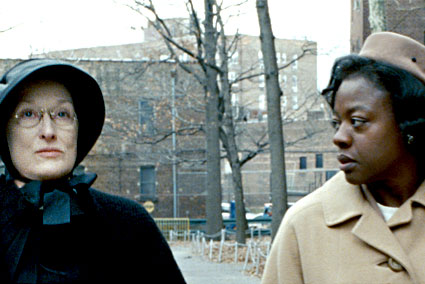I’ve been doing a sort of unofficial Feminism Week in my articles. And I thought I needed to cap it with a great feminist woman for today. However, finding a feminist woman who fit my criteria for inclusion in this column that I hadn’t already written about was harder than it should be. Many of the vocal ones are younger than I am, which is automatic grounds for exclusion. (Because it makes me feel weird and old.) Many of the others, I’ve already written about. Most of the remaining are people I either don’t like or simply don’t know enough about. I was thinking about Laverne Cox, but I must admit to not having seen any of her work. But Viola Davis, I’ve seen in things, and she seems to me to be the face of another aspect of the intersectional value of feminism—the importance of feminism for women of color. She’s also a fine actress who didn’t take Jared Leto’s crap.
Not that she was enough to get me to watch Suicide Squad, you understand. But I watched Doubt despite my intense dislike for Meryl Streep, and what it made me think was that Davis deserved more attention than she was getting. She had to hit a wider range than Streep did in that movie, and all in one scene. Okay, so she didn’t do it while Meryl Streep, which means she didn’t get as noticed. But it’s a powerful role. It makes me angry that the society we live in tends to limit women like Davis to supporting roles because they are black and middle aged. It’s hardly as though there aren’t black, middle aged women with valuable stories to tell.
I’m not going to pretend that my dislike of Streep has to do with the fact that she beat Davis for Best Actress in 2011. For one thing, I didn’t actually like The Help all that much and actually would have give the Oscar to Glenn Close for Albert Nobbs. For another, my antipathy way predates 2011! But it does seem to me that Streep is symptomatic of one of the reasons Hollywood needs feminism. As an experiment, I clicked on “1965” on IMDb. In the top five for “popular people born in 1965,” we have Robert Downey, Jr., and Mads Mikkelsen. Further down just the first page are John C. Reilly and Ben Stiller. Shah Rukh Khan. Not to mention Bryan Singer, Michael Bay, and Paul W. S. Anderson. But three of the women on the page have the word “beauty” appear in the snippet of biography that appears on that page, and the only woman to work behind the camera on it is Lana Wachowski, which is a whole other thing. It feels to me as though the industry decided that one Meryl Streep was enough, and they don’t need to give other women that kind of power career.
Especially not women of color, of course. Davis is the second black woman to win a Tony for Best Actress (two others, including Cicely Tyson, have since won). She’s actually the seventh to win an Oscar for Best Supporting Actress, and of course the rate is better for black women than, say, Asian women—while it was fifty-one years from Hattie McDaniel’s win to Whoopi Goldberg’s, the only Asian woman to win was Miyoshi Umeki in 1957. And I would argue that the women don’t win because the roles aren’t there. Davis herself has spoken about it, about how her portrayal of Annalise Keating is the first time a black woman has been shown as “messy, mysterious, sexy, and vulnerable” onscreen. Also bisexual, if that matters to you—and it probably ought, given the bi erasure in our culture.
I am delighted to discover both that there is finally a movie about Harriet Tubman in the works and that Davis is said to be cast in the part. I do worry that it’ll be yet another movie where I want to take her by the hand and lead her to a better movie; that’s depressingly frequent in her career. But even in movies like Extremely Long and Incredibly Dull, she’s a bright spot. I suffered through it, goodness knows, but having Viola Davis there made it at least a little better. I really hated The Help, mostly from a historical perspective, but she’s good in it, at least.
I won’t say that Davis is enough to get me to watch anything; while I might get around to Suicide Squad, it’s as much my superhero completism as a fondness for her in particular. Though I’ve heard nothing but praise for her performance as Amanda Waller, which I really do believe is inspired casting based on my familiarity with the character from other versions. And I’m glad that she, at least, refused to put up with the nonsense from Jared Leto, who I think left himself and the studio vulnerable for some pretty nasty lawsuits. It’s not just that Viola Davis deserves to have the studio protect her from that sort of thing. It’s that everyone working on the movie deserved to have the studio protect them from that sort of thing, and I think Davis would agree with that.

